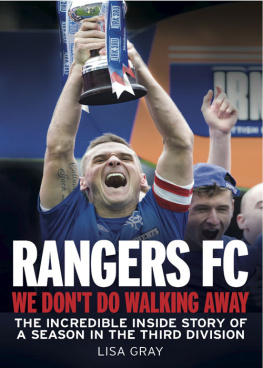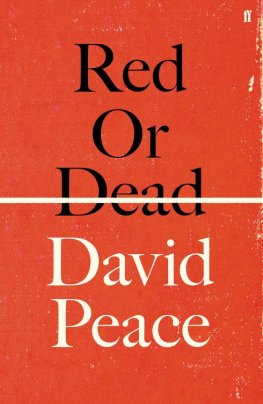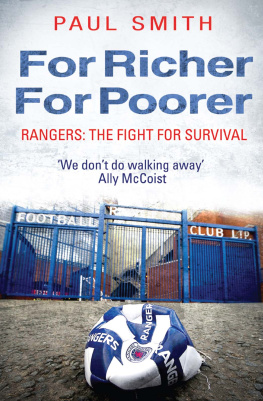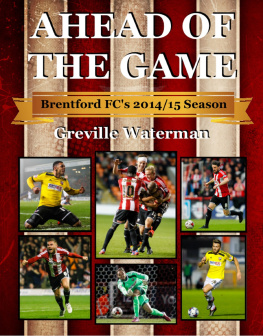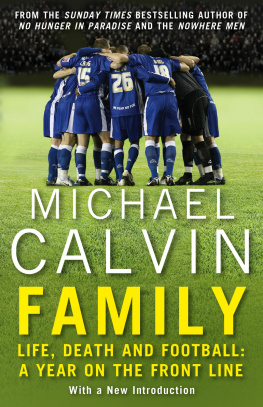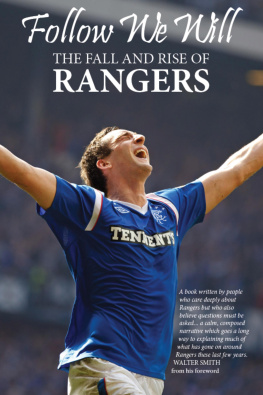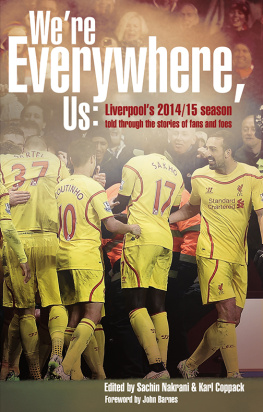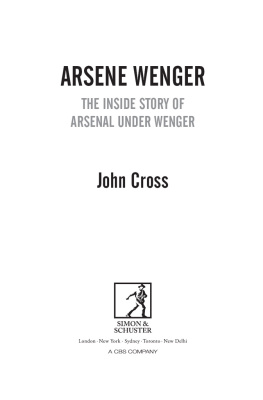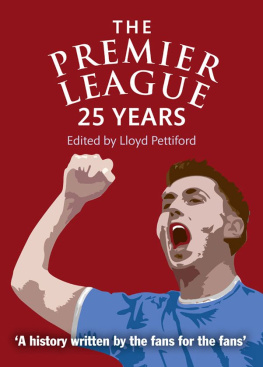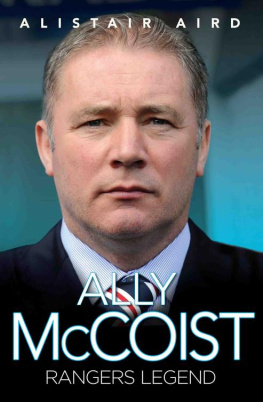Mum and Dad, Scott and Alison,
and Ben, Sam and Cody.
CONTENTS
A big thank you to all the people who agreed to be interviewed for this book, particularly the Rangers manager, Ally McCoist. Thanks also to Carol Patton and Stephen Kerr in the Rangers Press Office and Director of Communications James Traynor, for their help. It was very much appreciated.
To friends and colleagues within the media industry who provided help, advice and guidance (and lifts!) along the way thank you, you know who you are. I am also grateful to the Press Association for granting permission to work on this project and to the PAs Scottish Sports Editor, Gavin McCafferty, for helping me proofread a massive bundle of pages. Any mistakes, Im blaming you
Thanks to everyone at Black & White Publishing for their efforts, especially Campbell Brown, for giving the book the green light, and Kristen Susienka, for all her hard work.
Finally, thanks to my family for their constant love and support.
In the summer of 2005, I was handed what many football fans might regard as a dream job: the role of Rangers correspondent for the UK and Irelands national news agency. I had already worked for the Press Association for five years by then, covering everything from lower division team news to SPL matches and the occasional Old Firm game or press conference if one of the more senior reporters was on a day off or on holiday. I was the leg man (or woman!) for my then colleague Jon West, when Rangers clinched the title in extraordinary circumstances at Easter Road on a day that would go down in history as Helicopter Sunday. Weeks later, Jon announced his departure from the company and the Rangers gig was mine.
My first assignment was a pre-season trip to Canada. Eleven days in the blistering heat of a Toronto summer, conducting interviews with boss Alex McLeish and players such as Nacho Novo, Barry Ferguson and Fernando Ricksen. For myself, it felt a long, long way from the days spent as a rookie reporter covering lower league games at the likes of Albion Rovers and Dumbarton on a freelance basis for the Daily Record and, subsequently, the Scottish Mirror. Sure enough, Old Firm derbies and title wins and Champions League nights home and away followed, with the highlight undoubtedly the UEFA Cup Final in Manchester in May 2008.
Then, in February 2012, everything changed.
Sure, there had been whispers about administration for months, years even, but no one ever really believed it could actually happen. After all, this was Rangers, holders of a world record 54 titles, a club who had famously delivered Nine in a Row. European Cup Winners Cup winners, UEFA Cup finalists. A British institution. On Valentines Day, the financial collapse of the Glasgow giants was confirmed. The reality of the situation hit home like a Mitre Delta square in the face. In the end, it came down to a race between owner Craig Whyte and Her Majestys Revenue and Customs to see who could appoint their own choice of administrators first. Whyte won and Duff & Phelps seized control of the club.
The football ramifications, as well as the financial ones, were brutal and swift. Rangers were immediately docked ten points by the Scottish Premier League, leaving rivals Celtic with an unassailable 14-point cushion at the summit. The title race was effectively over. The long battle for survival had begun and challenging their Old Firm rivals for honours would quickly become the least of Rangers problems.
Before Ally McCoist, great managers had inspired with words as well as trophies. Bill Struths defiant declaration, Let others come after us, we welcome the chase and Jock Wallaces rousing rallying call, Weve got the battle fever on were as much a part of the fabric of the club as the famous marble staircase inside Ibrox. Two days after Rangers were forced into administration, McCoist produced a one-liner of his own that would perfectly capture the mood of the support and become the unofficial slogan for the fight ahead.
When asked if he planned to quit the job as a result of the financial collapse, McCoist replied, This is my club, the same as it is for thousands and thousands of Rangers supporters. Then, five words that would send cyber space into meltdown within minutes: We dont do walking away.
In the weeks that followed, there were claims and counter-claims. There were investigations, inquiries and then more investigations. Whyte gave the impression the so-called Big Tax Case was the reason behind the clubs insolvency, despite no verdict as yet from the First Tier Tax Tribunal, with Rangers disputing a claim by HMRC that the clubs use of Employee Benefit Trusts (EBTs) during Sir David Murrays stewardship breached tax laws. Whyte claimed the potential tax bill could be as much as 75 million. In fact, the real reason he was forced to call in the administrators was an unpaid tax bill he had himself accrued since purchasing Murrays majority shareholding for one pound in May 2011. It also emerged Whyte had used cash from a deal with finance firm Ticketus eventually worth in the region of 26 million for the sale of future season tickets to complete his takeover.
Failure to secure an agreement with creditors that would allow the club to emerge from administration resulted in Rangers being consigned to liquidation. Within days, Charles Greens consortium completed the purchase of the business and assets of the club for 5.5 million.
On July 4, Scottish Premier League clubs rejected newco Rangers application for entry to the top flight after five hours of talks at Hampden. The news would have been more shocking had the majority not already gone public with their plans to vote against the bid after canvassing their own fans and citing sporting integrity as the driving factor behind their decision. Only Kilmarnock opted against a no vote, abstaining from the voting process.
The supporters wanted a fresh start in the fourth tier of Scottish football and their wish was granted. Scottish Football League clubs voted yes to Rangers but no to a soft landing in the First Division, and life in the Third Division beckoned. A twelve-month transfer embargo for bringing the game into disrepute under the old regime, successfully challenged in the Court of Session, was reluctantly accepted, along with an agreement to settle all of the old companys football debts. Conditional SFA membership was granted less than forty-eight hours before the start of the new season.
McCoist stated, It is now over five months since Rangers went into administration. It is time to start playing football again.
It certainly was. As they might say on American reality TV shows, it was the beginning of a journey. A mad adventure that would take Rangers from Annan to Elgin and everywhere in between. And I was going along for the ride.
This book is the story of what happened next.
JULY
JULY 29, 2012
BRECHIN 1 RANGERS 2 (AET)
Glebe Park
Inside Glebe Park hangs an old framed cartoon from the last time Rangers faced Brechin City. The black-and-white sketch, now slightly discoloured by the passing years, had been carefully snipped from a newspaper more than a decade earlier after the two sides were drawn together in the Scottish Cup. It shows Ronald de Boer, Tore Andr Flo and Lorenzo Amoruso studying a map of Scotland, looking baffled, as the Italian defender asks, They call it a city, so where is this Brechin?
For Brechin, the drawing represents a major occasion in the clubs history, a lucrative trip to Ibrox for a third-round tie in front of thousands of people against Dick Advocaats household names in 2001. For Rangers, it represents the big money, big spending era, when the clubs finances were spiralling out of control as Sir David Murray chased success at any cost. Flo, the 12 million signing, whose arrival from Chelsea smashed the Scottish transfer record, was the poster boy for the blank-cheque era. Celtic had previously spent 6 million on Chris Sutton and Murray wasnt joking when he famously boasted, For every five pounds Celtic spend, we will spend ten.
Next page
